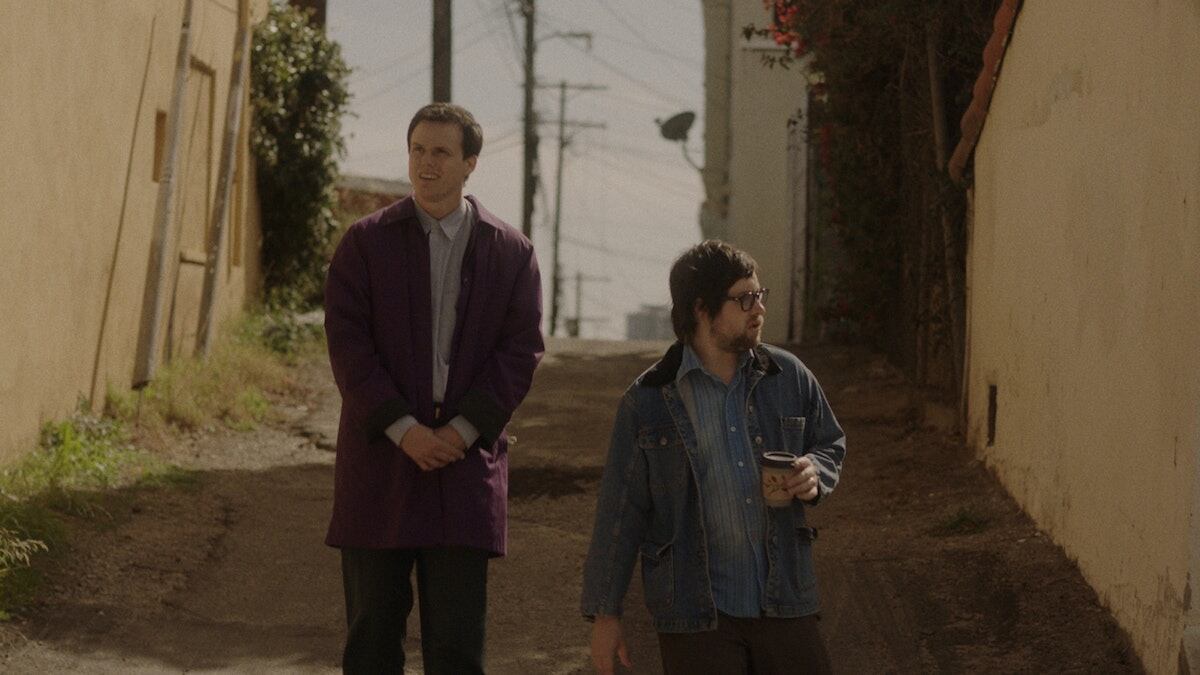THE CIVIL DEAD
*** Comedians Clay Tatum and Whitmer Thomas have been best pals for 20 years, but their debut narrative feature imagines a fainter bond. Tatum (who directed the film) plays Clay, a broke Los Angeles photographer who runs into struggling actor Whit (Thomas) on the street. It appears Clay has more or less ghosted his old friend from Alabama—fitting, given that Whit claims to be an actual ghost (cause of death unknown) who is visible only to Clay. Looking for a lifeline, Whit vocalizes that this is an experimental Casper scenario: a benevolent spirit buddying up with a human. Tall premise aside, the film’s generative force is the duo’s meandering chemistry and the silly way they mumble in support of idiotically jagged haircuts and dance-karate kicks. The off-key relationship comedy recalls improv-driven Joe Swanberg and Lynn Shelton indies, but what complicates The Civil Dead is the surprisingly bad underlying vibes and the question of why Clay, a person with nothing going on, struggles to engage with a willing friend. Things that go bump in the night may be asking for a little bro time, but do self-focused young artists have it in them to heed the dead’s desperate call? NR. CHANCE SOLEM-PFEIFER. On demand Feb. 17.
CLOSE
*** Even at its best—with relatively kind peers, teachers and families—middle school is hell. Adolescent socialization starts and, immediately, it’s an irreversible cascade for Léo (Eden Dambrine) and Rémi (Gustav de Waele), two best friends from the Belgian countryside. We first see them at summer’s end, as gangly mirror images dashing joyfully through Léo’s family flower farm. Their childhood bond is so “close” that, any hint of burgeoning romance notwithstanding, they are indeed experiencing a kind of love. But a relationship this unself-conscious can’t repel schoolyard scrutiny and early teachings in masculine insecurity. Some of the ensuing change to Léo and Rémi’s friendship is sudden and frankly unbelievable, calling into question what story writer-director Lukas Dhont really wants to tell (precariously, he’s searching for a universal experience within a distinct trauma). Yet Close, an Oscar nominee for Best International Film that is clearly inspired by Celine Sciamma’s intimate coming-of-age portraits (Tomboy, Girlhood), remains involving and intimate throughout—and it’s arguably a playbook for how adults should treat children. Maybe they just do middle school better in Belgium. PG-13. CHANCE SOLEM-PFEIFER. Cinema 21.
KNOCK AT THE CABIN
** M. Night Shyamalan’s Knock at the Cabin is the peanut butter and jelly sandwich of thrillers: It checks all of the boxes the genre requires, but leaves the palate yearning for more as the aftertaste of mediocrity lingers. Parents Eric (Jonathan Groff) and Andrew (Ben Aldridge) whisk their nature-loving daughter, Wen (Kristen Cui), away to the woods for a family vacation, but are met with four strangers knocking at their door, all wielding horrifying homemade weapons and spouting end-of-days premonitions (they include Rupert Grint, who emerges from his silver screen hiatus with a bang, and Dave Bautista in a powerhouse performance that is a far cry from his previous testosterone-fueled roles). As for production, the film’s two cinematographers, Jarin Blaschke (The Witch, The Lighthouse, The Northman) and Lowell A. Meyer (Topside, Thunder Road), have crafted a handful of ingenious images that would have taken even Hitchcock’s breath away (especially a masterful POV shot in which Grint is pummeled with a barrage of fists). Unfortunately, the plot, adapted from the novel The Cabin at the End of the World, is an inch deep and a mile wide. Plenty of interesting questions are posed throughout Knock at the Cabin (the film revolves around a nauseating moral dilemma), yet it concludes without providing a compelling or coherent response to any of them. R. ALEX BARR. Academy, Bagdad, Cedar Hills, Cinemagic, City Center, Eastport, Lake Theater, Laurelhurst, Living Room, Lloyd Center, Pioneer Place, St. Johns, St. Johns Twin, Studio One, Tigard.
THE VOLCANO: RESCUE FROM WHAKAARI
** While Fire of Love poeticized the quaking, deadly romance of Mother Earth, this Netflix documentary is more of an eruption anatomy. Minute by minute, The Volcano: Rescue From Whakaari chronicles the sudden, tragic bursting of New Zealand’s Whakaari (or White Island) in 2019 and the experiences of the dozens of tourists and guides who were trapped in an improbable nightmare. It’s a story worth telling, as most of director Rory Kennedy’s are (she made Downfall: The Case Against Boeing and Last Days in Vietnam), but perhaps not at feature length. The preeruption dread is as powerful as witnessing survivors’ scars, but the straightforward rescue mission marks a major slump, a series of “just the facts, ma’am” interviews with pilots, cops and volunteers who did what they could expediently, and explain only that much. Intermittently, the film verges on criticizing ineffective threat systems or irregulated eco-tourism, but The Volcano isn’t willing to explore controversial ramifications, even to illustrate how responsibility was eluded. The film honors lives lost and given, but a prime-time news special could do the same. PG-13. CHANCE SOLEM-PFEIFER. Netflix.

